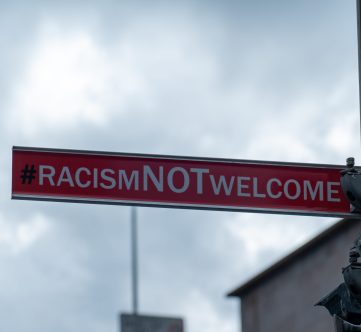Racial discrimination in the UK immigration system
Written by: Caroline Echwald

The United Kingdom, a racially and ethnically diverse nation, has long grappled with accusations of racism within its immigration system. Recent legislative developments have once again brought this issue to the forefront. In this article, we mark the week of International Day for the Elimination of Racial Discrimination by delving into the evolving landscape of the UK immigration system, shedding light on the systemic racism embedded within it.
The roots of racism within the UK immigration system can be traced back to colonial-era policies. With the Windrush scandal, the wrongful detention and deportation of Caribbean migrants who had been living in the UK for decades was exposed. Despite promises of reform in the aftermath, racial bias continues to permeate the structures of immigration in the UK, disproportionately affecting racialised and minoritized individuals. Recent legislative developments have once again brought this issue to the forefront, further exacerbating racial inequalities within the immigration system.
The Illegal Migration Act, enacted in 2023 in response to concerns over ‘irregular’ migration, introduces harsher penalties for individuals entering the country ‘illegally’. While supposedly aimed at deterring unlawful immigration, critics argue that the Act disproportionately impacts racial and ethnic marginalized communities. The Act’s punitive measures, such as increased detention and deportation, fail to address the underlying global and historical factors driving migration while perpetuating discriminatory practices within the immigration system. When it comes to the purported concern of ‘boat people’ arriving through ‘irregular’ routes, it is particularly noteworthy that 71% of those arriving by these means are from Muslim-majority and African countries and is a direct result of the lack of safe routes available to seek protection in the UK. This is the case even though on average 86% of people arriving from these countries are granted asylum, and thus recognised as being in need of international protection.
A clear example of the racial lines the UK immigration system is draw up around, is the approach to migrants from Afghanistan and Sudan compared to those arriving from Ukraine, in the wake of conflict in each of these countries. The Afghan resettlement scheme have been deemed unfit for purpose, only managing to resettle 54 Afghan citizens, while no relocation schemes were made available for Sudanese nationals. This stands in stark contrast to the routes of protection available to Ukrainian refugees put in place in March 2022 after Russia’s invasion of the country in February of the same year. Safe routes such as the Ukraine Family Scheme and Ukraine Sponsorship Scheme which has allowed 253,800 Ukrainians to seek safety in the UK, highlight the entrenched discrimination and injustice within the immigration system by the willingness to accept some migrants while others, notably racialised migrants, are perceived with a rhetoric of suspicion, as ‘invasive’ and consequently deemed less worthy of coming to the UK.
The proposed Safety of Rwanda (Asylum and Immigration) Bill, currently going through readings at the House of Lords and House of Commons, is another aspect of these racially discriminatory provisions regarding asylum seekers. The Bill proposes measures to ‘streamline’ the asylum process and enhance border security, with a particular focus on sending asylum seekers to Rwanda if they arrive via irregularly routes. While it is suggested that this bill is put in place to deter anyone from arriving irregularly through dangerous journeys, keeping in mind who tends to arrive via irregular routes, as explored above, it is clear that UK immigration policy is biased in terms of race, and seek to externalise, not just the asylum processes but also ‘undesirable’ racialised migrants.
Measures presented in this bill not only undermine the rights of asylum seekers but also risk exposing them to further harm and exploitation, and raises concerns about the UK’s commitment to upholding its obligations under international law and protecting the rights of migrants.
Beyond immigration policy
It is not only the recent and proposed changes to the law that underline the systemic racism within the UK immigration system.
Recent events highlight the pressing need to address racism within the UK immigration system and more broadly. Conservative MPs, Lee Anderson and Paul Scully, have both faced criticism for racist and Islamophobic remarks alluring to racial and ethnic minoritized groups ‘taking over’ London. Such inflammatory rhetoric not only perpetuates harmful stereotypes but also reinforces discriminatory attitudes towards racialised and migrantised communities within the UK.
These incidents highlight the necessity of holding public officials accountable for their words and actions, and how rhetoric about ‘illegal migrants’ and ‘foreigners taking over cities’ is used to justify further discriminatory migration policies.
This is particularly clear when looking at how the discriminatory nature of UK immigration laws extends beyond legal frameworks and external borders. The Hostile Environment Policies which now permeate much of UK society, was originally implemented to deter illegal immigration and have had devastating consequences for marginalised groups. From the denial of healthcare and the “right to rent” scheme, to the deprivation of Citizenship, these policies have perpetuated racial discrimination, islamophobia and xenophobia. As a result, migrant communities, and other minoritized communities in the UK, face heightened levels of surveillance, harassment, and deportation threats. This hostile environment not only manufactures a sense of precarity among these communities but also undermine the fundamental principles of an equal and just society for all.
As advocates for a just and humane legal system, it is imperative that we challenge the systemic racism ingrained within the UK immigration system. This requires comprehensive legislative reform, rooted in principles of fairness, dignity, and respect for human rights. To this end, greater accountability and transparency are needed to ensure that discriminatory practices are eradicated and that all individuals are treated with dignity and respect, regardless of their immigration status, ethnicity, or race.
Conclusion
The fight against racial discrimination within the UK immigration system has long been taking place within communities, but recent developments serve as a stark reminder of the urgency of this issue. By confronting systemic racial discrimination head-on and advocating for meaningful change to legislation, we can strive towards a more inclusive and equitable immigration system. As we mark International Day for the Elimination of Racial Discrimination this week, it is time for the UK to uphold its commitment to justice and human rights, both within its borders and beyond.
-

From words to violence: How racist rhetoric and scapegoating is fuelling the ongoing far-right violence
Written by: S. Khan
In response to the recent surge in organised racist, Islamophobic and violent riots across the United Kingdom, we, Seraphus, stand in solidarity with those targeted by these despicable acts. The disturbing wave of far-right violence has not only inflicted fear upon racialised communities but has also attacked the institutions dedicated to supporting migrants and asylum seekers. Attacks […]Read article -

What will a new Labour government mean for UK immigration policy?
Written by: Caroline Echwald
The Labour Party’s landslide victory in the recent general election has the potential to mark a turning point for UK immigration policy. With a clear mandate, Keir Starmer’s government is could implement changes to reshape the UK’s approach to asylum, skilled workers, and broader immigration issues. But will they? Or will they instead sell surface […]Read article -

Safe routes for all: Safeguarding Palestinians and the right to migrate
Written by: Caroline Echwald
In this article, we delve into the urgent call for fair and compassionate immigration policies, particularly focusing on the need to establish safe routes for Palestinians in Gaza to reunite with their families in the UK. As the geopolitical instability and future, environmental changes persist, it gives rise to consider how this lack of pathways […]Read article
Categories: AsylumHuman RightsImmigration Rights
